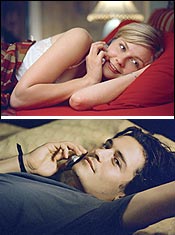
It’s tough being a creator of popular culture if what you prize most is sincerity, gentleness, and optimism. Over the past 30 years or so, critics and a fair portion of the audience have come to believe that great entertainment or—cough, cough—art must be harsh, downbeat, or at the very least knowingly ironic. If HBO’s Deadwood portrays the Old West as caked with mud and profanity, why, this must be the gritty truth! But if two lovers are united by an iceberg and a very big boat, isn’t Titanic just The Poseidon Adventure with better special effects?
No, it is not. But as an unabashed fan of both Titanic and Deadwood, I recognize that sincerity is a tricky quality to put over in these snarky times, which makes the artistic failure of Cameron Crowe’s Elizabethtown all the more sad. Crowe’s greatest successes have been films that celebrate openhearted, transformative love (think John Cusack in Say Anything; Renée Zellweger in Jerry Maguire) or pure innocence (the Crowe-surrogate rock writer in Almost Famous). Elizabethtown has been conceived as his grandest statement yet on these themes, based as it is in Crowe’s own experience of grieving for his father. But instead, the film pushes the charm of its two stars, Orlando Bloom (an urban lad journeying to rural Kentucky to retrieve the remains of his recently deceased father) and especially Kirsten Dunst (as a flighty flight attendant), so hard and so repetitively that it renders them charmless. In fact, Crowe has managed something I thought impossible—he’s made Dunst’s radiant smile, such a pleasure in the Spider-Man movies, a rictus mask of looniness.
But then, conveying sincerity isn’t simply a matter of accentuating the positive. Even the most sincere sincerity can taste sticky-sweet going down: That’s cornball, not a lump, lodging in one’s throat when even the indomitably spunky Amy Grant grants Three Wishes. I have no doubt there’s a free-floating desire out there for nondenominational, apolitical Good News: Movies like Elizabethtown are prone to develop a cult following, whatever their flaws. But ironically, if you’ll excuse the expression, director Curtis Hanson comes a lot closer to this in his lovely, slightly sappy In Her Shoes, which hasn’t yet found the huge audience it deserves. Both Crowe and Hanson have obviously thought a great deal about the nature of family, love, and all that good stuff, but with a crucial difference. In Her Shoes works in sincerity’s best mode, which is to be clear-eyed and hardheaded about misty emotions. Elizabethtown feels as though Crowe was so besotted with his characters, his actors, and his heartland-rock soundtrack, that he just lets it all spill out, hoping we’ll go with his effulgent flow. Despite a valiant attempt to edit the movie since its disastrous debut in Toronto, he’s still stuck with a Poseidon Adventure instead of a Titanic, sinking under the weight of damp, heavy spiral notebooks filled with extra scenes, run-on romantic dialogue, and classic-rock soundtrack possibilities. Elton John just sings (over and over) “My Father’s Gun.” You may feel Crowe is putting it to your head.